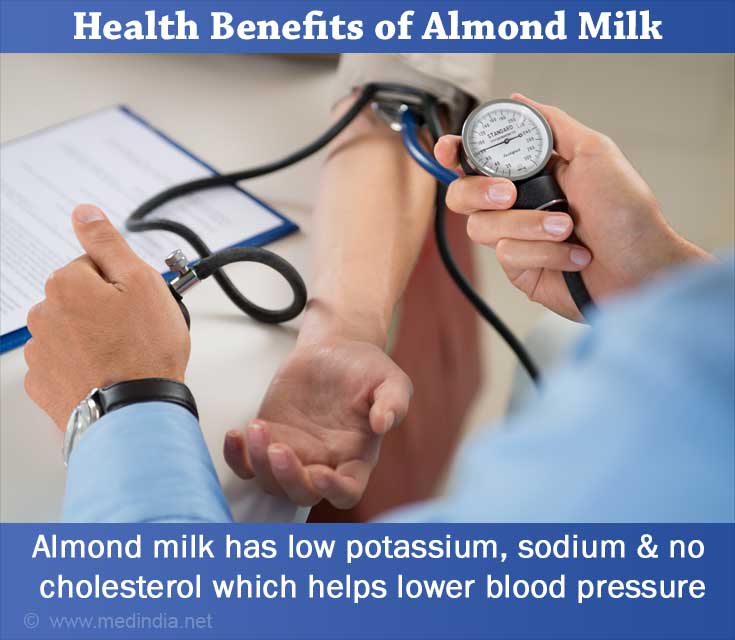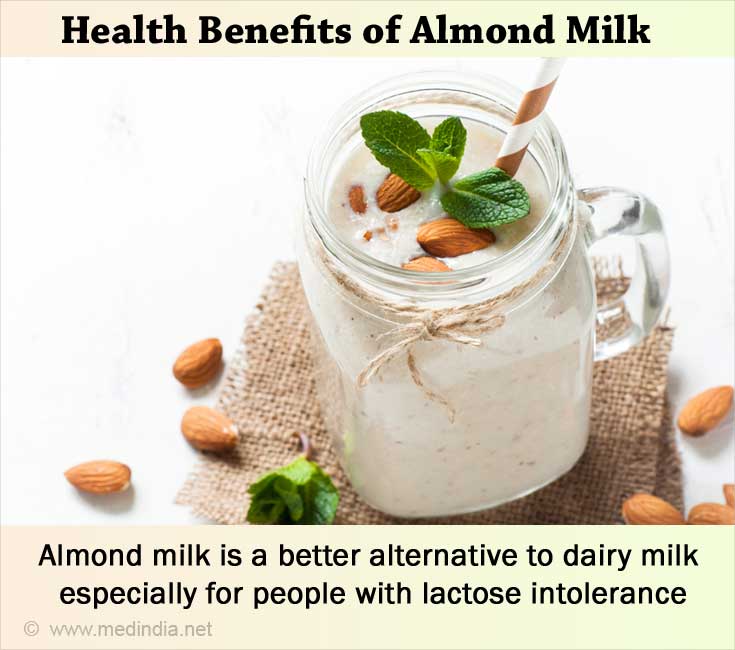- Pros and Cons of Almond Milk - (http://www.fitday.com/fitness-articles/nutrition/healthy-eating/pros-and-cons-of-almond-milk.html#b)
- Benefits Of Almond Milk - (http://thescienceofeating.com/proteins/benefits-of-almond-milk/)
- Almond Milk: What Is It and Is It Good for You? - (http://www.fitday.com/fitness-articles/nutrition/healthy-eating/almond-milk-what-is-it-and-is-it-good-for-you.html#b)
About
The milk section in supermarkets have so much variety to offer that most people are perplexed by it. The milk section has expanded beyond cow’s milk. In the plethora of milk options, almond milk is one of the most popular chsoices.
What is Almond Milk?
Almond milk is a beverage commonly used instead of milk. It is made by toasting and grinding almonds and then blending them with drinking water. Almond milk is fortified with some vitamins and minerals that are not naturally present in the beverage.

Almond milk has been found to be more beneficial than dairy milk because it is subject to much less processing and contains a substantial number of naturally occurring nutrients.
Almond milk has an array of benefits as mentioned below.
Nutritional and Health Benefits of Almond Milk
- For those looking to lose weight, almond milk is the perfect choice. An 8oz serving of almond milk (with no added sugar) contains only 60 calories. This is much less than the caloric value of the same quantity of skimmed milk.
- It contains an impressive amount of calcium which helps in improving and maintaining bone health. One cup of almond milk provides about 300mg of calcium.
- It is a good source of vitamin A, D and E. One cup of almond milk provides 10% of the Required Daily Allowance (RDA) for Vitamin A, 50% of RDA for Vitamin E and 25% of RDA for Vitamin D. Vitamin A and E are excellent antioxidants, enhance the immune system and protect the body tissues from damage. Vitamin D is vital for calcium absorptions and this helps improve bone health.
- Almond milk is a good source of omega fatty acids which improve heart health.
- In comparison to regular and soy milk, almond milk contains less potassium and phosphorus. This is a huge benefit for people with chronic or acute kidney diseases as these nutrients must be restricted.
- For diabetics, almond milk is a better option than regular milk as it contains only about 8g of carbohydrate. This makes it low glycemic in nature and can be utilized completely for energy.
- Low potassium, sodium and no cholesterol are properties of almond milk which makes it ideal for individuals with high blood pressure.
- Almond milk helps improve power and muscle strength owing to the presence of riboflavin and iron. This is especially beneficial to athletes. It is however low in protein.

Other Benefits
- Almond milk does not need to be refrigerated like dairy milk. It can be stored at room temperature and will not spoil.
- Unflavoured almond milk is also a better alternative to soy milk as it contains no added sugar.
Lactose Intolerance and Almond Milk
Since there is no dairy milk used in the preparation of this beverage, almond milk is the perfect alternative to regular milk, for those with lactose intolerance.
Nut Allergies and Almond Milk
Some people are allergic to nuts and must not consume almond milk as it might trigger an allergic response and in some severe cases be fatal. It is also not routinely recommended for infants for the same reason.
Can Almond Milk always be used to replace Cow’s Milk?
Yes, most of the time. Almond milk can be used in smoothies, soups, sauces, coffee and cereal. It does not function the same way as dairy milk when used to make puddings and yoghurt.

Is almond milk good for you? The answer is simple – YES, provided you are not allergic to it. When consumed in moderation (the unsweetened kind), almond milk is diet-friendly, heart-friendly and packed with nutrients. To add to this it can be stored easily. Consume almond milk as you would dairy milk and see benefits in several aspects of health.








